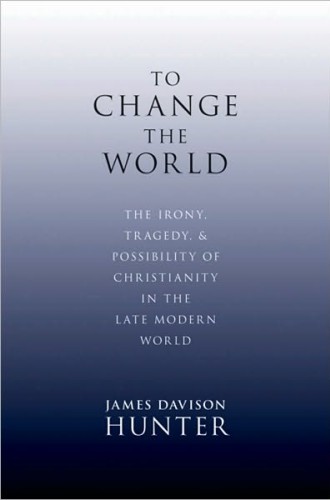A review of To Change the World
The call to make the world a better place is inherent in Christianity. But why have so many efforts by Christians gone so tragically wrong? James Davison Hunter observes that although a vast majority of people in the U.S. are professing Christians and many are very religious, our culture—business, law and government, the academic world, popular entertainment—is intensely materialistic and secular. Why is this? Why are religious people not changing our culture?
Director of the Institute for Advanced Studies in Culture at the University of Virginia and author of Culture Wars: The Struggle to Define America, Hunter argues that Christians in the U.S. have a fundamentally flawed understanding of what culture is and how cultures change. Many mistakenly hold to an idealistic, "specious social theory" that culture changes when hearts and minds—people's values and worldviews—are changed. According to Hunter, "This account is almost wholly mistaken."
Read our latest issue or browse back issues.
Christians need a better social science. As a system of truth claims and moral obligations that is largely coterminous with language, culture is a product of a long historical process, and it changes slowly. Christians also need a better understanding of power, to which Hunter devotes a third of his book. Culture is embodied in enduring institutions and expressed through technological innovations. "The deepest and most enduring forms of cultural change nearly always occur from the 'top down,'" so the capacity to define reality "is not evenly distributed in a society, but is concentrated in certain institutions and among certain leadership groups who have a lopsided access to the means of cultural production. These elites operate in well-developed networks and powerful institutions."
Christians are also tragically wrong, Hunter writes, because the "emphasis on values, choice, and spiritual renewal has predisposed nearly everyone to focus on politics as the central means of changing the world." Since the early 1980s, "the dominant public witness of the Christian churches in America . . . has been a political witness." Many Christians focus almost exclusively on the state, equating it with the public sphere, and many put enormous energy into electoral politics and public policy issues. "The belief that the state could help us care more for the poor and the elderly, slow the disintegration of traditional values, generate respect among different groups, or create civic pride, is mostly illusory. It imputes far too much capacity to the state and to the political process."
Hunter develops a typology of political theologies in the U.S. The Christian right adheres to a "defensive against" paradigm and seeks to restore a "Christian America." Though its adherents mean to make the world a better place, the leading edge of their initiatives is negation. Their sense of loss and their anger over the "threat" of secularism leads to a spirit and strategy of conquest and to the corruption that accompanies their yearning for political power.
Those on the Christian left operate according to a "relevance to" paradigm. They are animated by the vision of social justice found in the Hebrew prophets and the words of Jesus, and they hold a unified contempt for the Christian right. Hunter argues that Jim Wallis confuses the theocratic setting of the Hebrew prophets with a vision for a democratic context. The prophetic vision becomes a "civil religion of the left," which ironically "imitates the Christian Right in style and method."
The neo-Anabaptists hold to a "purity from" paradigm, Hunter explains. They reject worldly violence and are animated by discipleship and the centrality of the church as a new society. While the neo-Anabaptists and the Christian left are united in their opposition to the Christian right, the neo-Anabaptists differ from the Christian left in their mistrust of the state's "structure, action, and use of power." Hunter argues that with their emphasis on the "politics of Jesus" (John Howard Yoder) and opposition to the state, the neo-Anabaptists ironically politicize the gospel. The emphasis on purity from the world, he contends, lacks a positive view of God's passion for the world.
Hunter grounds his alternative paradigm, "faithful presence within," in the incarnation, the Word made flesh. Incarnation is the basis for practices of human flourishing within all dimensions of creation—the family, the workplace and the commons, which is broader than the state. He identifies with Jeremiah's exhortation to the exiles to "seek the welfare of the city where I have sent you into exile, . . . for in its welfare you will find your welfare." He criticizes the split between the secular and the spiritual among evangelicals and fundamentalists who devalue work in the world for its own sake and instrumentalize these tasks for narrow spiritual ends. He criticizes the Christian left for distorting a more holistic vision of the gospel in their too one-sided passion for social justice. The neo-Anabaptists, he says, limit faithful presence to being the church; they lack a vision for the restoration of creation.
According to Hunter, the Christian right and left have a too sanguine view of how power works in the world, disregarding the fact that "the natural disposition of all human power is to its abuse." "Faithful presence within" embodies the alternative power modeled by Christ, who exposed the illusions of worldly power. Hunter agrees with the neo-Anabaptist critique of Constantinianism (the temptation to control history to make it come out right), but he criticizes the neo-Anabaptists for their lack of a positive view of redemptive power in the world. Christ's victory over the powers, he writes, "frees all Christians to actively, creatively, and constructively seek the good in their relationships, in their tasks, in their spheres of influence, and in their cities."
In the end Hunter comes full circle and asks whether faithful presence will change the world. His surprising answer is that this is the wrong question. It is wrong because it is based on the "dubious assumption that the world, and thus history, can be controlled and managed." The belief that we can change the world is a dangerous idea. "Righteousness can quickly become cruelty and justice can rapidly turn into injustice."
Seeking to change the world makes devotion to God a tool of a secondary objective, writes Hunter.
Christianity is not, first and foremost, about establishing righteousness or creating good values or securing justice or making peace in the world. Don't get me wrong: these are goods we should care about and pursue with great passion. But for Christians, these are all secondary to the primary good of God himself and the primary task of worshipping him and honoring him in all they do.
Hunter's book has problems of both method and content. His typology is flawed and unconvincing. He drives wedges between positions and creates unfair and unnecessary dichotomies. Promising nuances within types are forced into too rigid categories. Also, it is unclear in what sense Hunter's vision of faithful presence includes the justice emphasized by the prophets and Jesus. Does he mean to say in his critique of Jim Wallis that the theocratic context of the Hebrew prophets nullifies the potential of their normative vision for American democracy? And Hunter's description of Jesus and power is too benign to account for why Jesus' engagement of the powers led to the cross.
Furthermore, Hunter's view that cultural change is largely sought in a top-down manner fails to consider adequately the role of people's movements. He also mischaracterizes neo-Anabaptists, many of whom, like Yoder and myself, claim Jeremiah's vision to "seek the welfare of the city." For many neo-Anabaptists, "faithful presence within" is a more accurate label than "purity from." To say that "theirs is a world-hating theology" is an unfair caricature. Finally, what sense are we to make of Hunter's uncritical patriarchal language, as in "the primary good of God himself"?
Despite these weaknesses in his argument, Hunter addresses important and relevant issues that all Christians in the U.S. need to consider. His ideas and analyses are frequently insightful and helpful, and his style is provocative and engaging.






